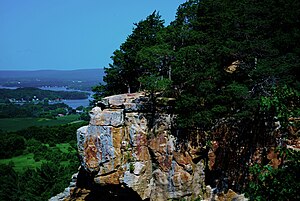Black River Escarpment (Wisconsin)
Jump to navigation
Jump to search

The Black River Escarpment is a geological feature in Eastern Wisconsin that includes Gibraltar Rock, an isolated outcrop overlooking the Wisconsin River..[1][2][3] The escarpment runs parallel to and between the Niagara Escarpment and the Magnesian Escarpment. The escarpment marks the boundary between bedrock from Lower Magnesian limestone bedrock and earlier Black River limestone. The escarpment emerges from Green Bay, on Lake Michigan. The escarpment's boundaries are not always visible to the untrained eye, but are marked by cliffs in some regions.
Gibraltar Rock is an isolated outcrop of the Escarpment, that overlooks the Wisconsin River.[4] Sightseers follow a hiking trail to its top, because it provides a scenic view.
References
- ↑ Summary of Hydrogeologic Conditions by County for the State of Michigan, United States Geological Service. Retrieved on 2023-10-14. “The moraines north of the Black River escarpment are composed of sand and gravel dominated till, while the moraines south of the Black River escarpment are composed of clay dominated till or boulder and clay dominated till.”
- ↑ Lawrence Martin (1965). The physical geography of Wisconsin. University of Wisconsin Press. ISBN 9780299034757. Retrieved on 2010-09-14.
- ↑ The Eastern Ridges and Lowlands of Wisconsin, Wisconsin Online. Retrieved on 2010-09-14. mirror
- ↑ Gibraltar Rock: Columbia County, Wisconsin. Retrieved on 2023-10-14. “Gibraltar Rock is a sandstone bluff that rises up, suddenly, out of the earth and is an outlier of the Black River Escarpment that was, at one time, attached and has become separated by erosion.”
